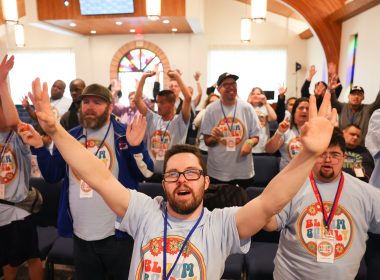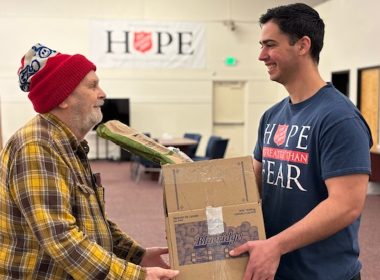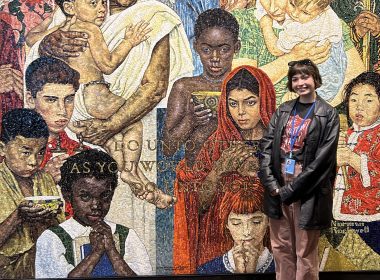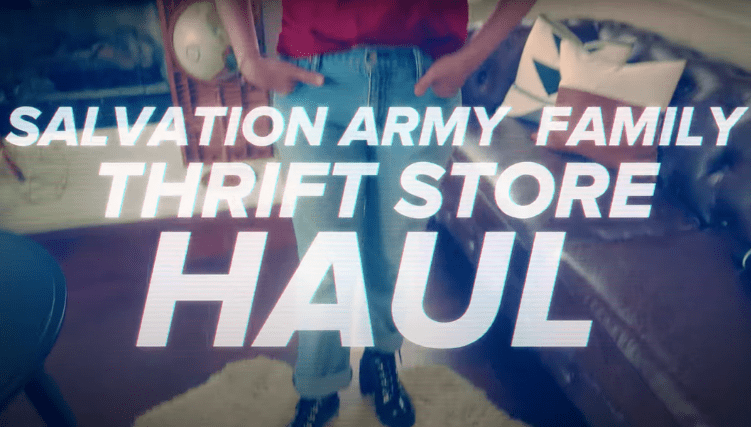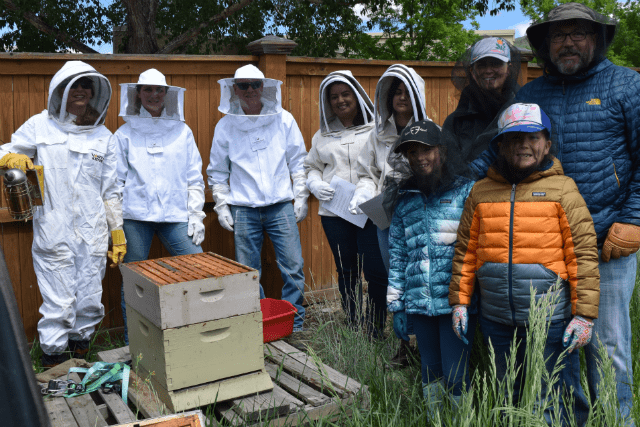A Scripture study from Caring, part four of five.
Read part three here.
Part 4: He is the Way
Behind the scenes
Read what Scripture says in John 13:1-30.
Beyond the surface
One of the most fascinating stories in Scripture is how Jesus conducts himself during the Last Supper. In John 13:1-30, Jesus hosts the Passover meal with his disciples. This account, within all four gospels is rich, substantial in theology and relevant for Christian practice. Jesus performs three significant acts to demonstrate how Christ not only is our salvation, but he is also the way of life. He is our example for how we are to live and conduct ourselves toward one another.
First, Jesus exemplifies servanthood as he takes on the form of a servant through washing the feet of his disciples. He also extends mercy by offering bread to his betrayer-to-be, Judas. Finally, Jesus portrays knowledge of the heart, meaning he knows when one’s heart is not in the right place while participating in religious acts.
For context
In the historical context of the passage, Jesus was the meal host. Typically, a servant of the house would have washed the feet of the guests. It must have been surprising for the disciples to witness Jesus, their “Teacher” and “Lord” take on the form of the servant (John 13:14) and begin to wash their feet.
It was also common for the meal host to dip the bread into the bowl and give it to an honored guest as a sign of special friendship.
As the host, Jesus dips the bread and gives it to Judas to honor him in front of the other disciples. John is on his right, leaning against Jesus (John 13:23). Therefore, Judas would have been on his left, since Judas dipped with him at the table (Mark 14:20). According to the Cultural Backgrounds Study Bible, this would convey that Judas was an honored guest. That’s quite remarkable given the fact that Judas was about to betray him.
Think about it
The way of Jesus is to practice humility and servanthood through washing the feet of his disciples.
He not only performed the action of foot washing, but he also demonstrated humility as an example for his disciples.
This is a difficult task, and it is one that would require vulnerability. Can we hide anything from the Lord, who is willing to see our feet and who loves us anyway?
Are we willing to allow others to see the dirt, grime, stains, cuts and bruises on our feet?
This would require that we, as God’s people, guard and protect a sense of true and authentic community where people feel safe to be transparent and vulnerable. True community and service means a willingness to share life, be vulnerable and know there is still unconditional love and acceptance.
The way of Jesus is to demonstrate grace through extending love and mercy to those who brought him pain.
Even though he recognized that the Scripture needed to be fulfilled from Psalm 41, it was not fulfilled by an enemy or a stranger, but he was betrayed by his friend who “shared bread” with him.
Knowing he was going to betray him, he gave Judas a sign of friendship in front of the disciples.
The way of Jesus is to illuminate the hearts of the people.
As he hands bread to Judas, we learn from Jesus that it’s possible for one to be in his presence and to outwardly receive his offer while remaining unclean inwardly.
In Luke 22:19, as Jesus breaks and distributes the bread, he symbolically conveys this is his body broken and given for them. Judas takes this bread, but inwardly, he was unrepentant from his heart, as Satan entered him (John 13:27) and then he went out to betray Jesus.
Between the lines
Christ wants to be made known through his followers, and Christ desires that those who love him and follow him do so in daily practice and not merely with words.
Here are some practices for God’s people to guard and maintain:
Christ wants us to offer a place of vulnerability and loving community.
By washing each other’s feet (symbolically) in service, regardless of position, power or garments, we realize we all walk the same path. We all have to walk on the ground. We all are in need of cleansing and healing; we all have hurts, cuts, stains and bruises that Christ wants to cleanse and heal.
Christ wants to be made known in how we treat the Judas in our life.
It’s easy to love those who love us, but it’s more challenging to unconditionally love the ones who have hurt us. Christ challenges us to love the Judas in our life
Christ wants a community of people who have been changed and transformed from the inside out.
Jesus brings illumination to the heart. He knew that even though Judas received the bread from Jesus, he was unclean on the inside. Christ desires repentance of the heart.
- How can you guard and maintain a safe community where people can be vulnerable and find healing?
- What does it mean for us to know Christ can transform our hearts and reveal areas where we need change?
Sign up for the Do Good Digest, our weekly newsletter, and stay tuned next week for part five.
Do Good:
- Download the full study and find more like it from Caring in the Scripture study library.
- Visit westernusa.salvationarmy.org to find The Salvation Army nearest you.
- Give to support the fight for good in your community.
- Did you know The Salvation Army served more than 23 million Americans last year fighting hunger, homelessness, substance abuse and more—all in a fight for good? Where can you help? Take our free quiz to find What’s Your Cause and how you can join in today.


